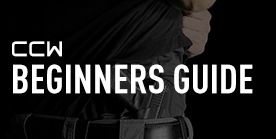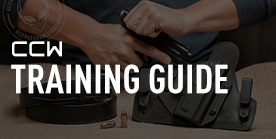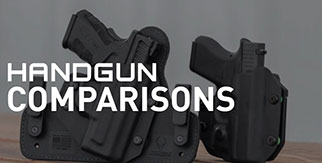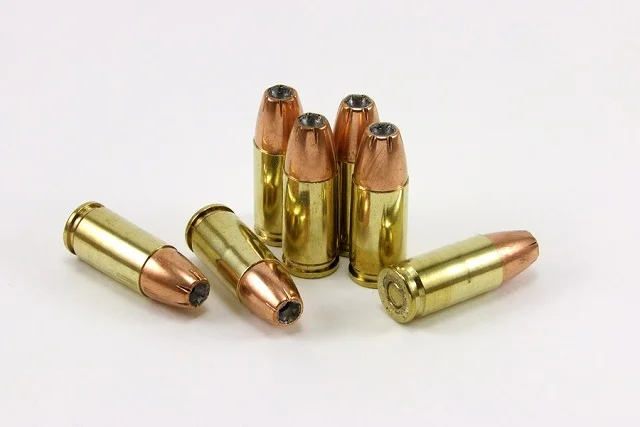
What's The Best 9mm Ammo?
Finding the best 9mm ammo for concealed carry, duty or other purposes has long consumed both the shooting public and also the ammunition industry for some time now. Many people purport that one particular brand or particular brand of them are, of course, but which one really is?
Define "best." Best for whom? And compared to what?
There are, though, a few attributes that the best or at least very, very good 9mm ammunition will have. Let's go over what that entails.
Defining Good 9mm Ammunition

Before we get rolling, we should probably define the "best" 9mm ammunition. What makes one brand or particular box really good and what makes another one not so good?
Performance is one aspect. Carry ammo has to do the job it's made to do, which is fly straight, penetrate to sufficient depth and - in case of jacketed hollow points - expand sufficiently to open up a larger wound channel, dump the round's energy into the target and come to a stop before exiting. If it doesn't work, it's only good for the range.
As far as self-defense ammo goes, there are a few brands with an established track record in real-world use. Typically, it's carried by police and word gets out that they're happy with it. With others, you must rely on ballistic testing done by various people. While shooting a bullet into ballistic gel tests isn't perfect by any means - it's a poor substitute and most people don't bother putting things like a ribcage in the gel for realism - it gives you an idea of how well it might work.
Reliability is another. After all, what good is any 9mm ammo hollow point if you can't trust every round to ignite?
Another is price. Granted, 9mm ammo isn't expensive; even the good stuff is bargain-basement compared to rifle rounds. (If you think a box of HST is expensive, go get a box of Nosler Partition, even in something common like .30-06.) That said, it's one thing to spend a lot of money for really good ammo; it had better work or else no one will buy it. Good ammo you don't have to spend much for? Even better!
Another factor, though, is totally subjective and that is how well it shoots in YOUR gun. You'll probably find that many brands and specific product lines thereof are okay but a few really stand out. Those are the ones to get.
If the 9mm ammo in question is a proven performer, if getting it doesn't break the bank and it works well in your gun, you've found a winner. Now, with that said, let's go over some popular types of 9mm ammo that are very popular for self-defense.
Hornady Critical Defense 9mm Ammo

One of the most popular 9mm ammo brands for self-defense is Hornady Critical Defense. Critical Defense is the civilian carry counterpart to Critical Duty, their duty ammunition line that's found wide adoption in the law enforcement community. Both rounds feature a similar design (though not the same) as a jacketed hollow point with a polymer insert.
The polymer insert acts as an assist. When the bullet enters a soft target, the polymer nub in the bullet puts additional hydraulic pressure on the cavity in the bullet, making expansion more reliable.
Critical Defense was designed for use in short barrels, so it can be carried in either a full-size gun or a compact like an M&P Shield or Springfield XD-S. Its counterpart, Critical Duty, was designed for use in duty pistols, so it is better reserved for use in full-size guns.
Critical Duty is a known performer, and Critical Defense is a very popular carry round, so it's an excellent choice. Ballistic testing by various parties indicates as much.
There is, however, a slight caveat. Hornady's Critical Duty and Critical Defense bullets - namely the projectiles, not the cartridge - require a little bit be trimmed from the case mouth to fully seat into the case. The slightly shorter case (less than 1mm is taken off) gives some guns indigestion, so make sure to check to see if your gun (or guns) can feed it reliably.
Federal HST 9mm Ammo
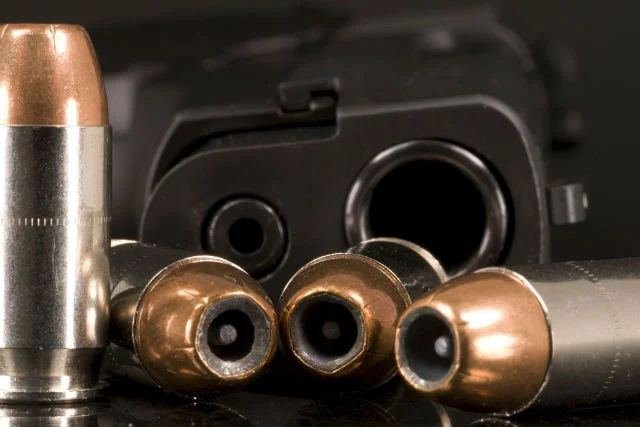
Another popular 9mm ammunition brand is Federal HST. Federal HST succeeded Hydra Shok as the premier handgun ammunition made by Federal with a number of design improvements over its predecessor.
Federal 124-grain and 147-grain HST (both standard pressure and +P loads) are some of the most common duty loads nationwide, and have a track record second to none.
It's known to do fairly well in short-barreled pistols, so you can carry in a compact such as a Glock 26 or Glock 43. Federal does make a short-barrel load, so you may wish to consider it.
HST ammunition mechanically locks the lead core to the jacket, so the round acts like a bonded hollow point without actually bonding the two layers. The tip of the jacket is skivved (thinned) to make expansion more dramatic and reliable, and testing (and real-world use) has indicated HST does so more dramatically and reliably than Hydra Shok, which was practically the go-to carry ammo for some time.
A "law enforcement only" line called HST Tactical and the civilian brand are both made by Federal. The former is supposed to only be sold to cops, but some ammunition sellers will sell it to civilians. The latter can be found in most gun stores.
Federal HST is one of the few no-brainer choices. If your gun cycles it, and it shoots to your sights, there's no reason to bother with anything else if you don't have to.
Winchester Ranger T Series 9mm Ammo
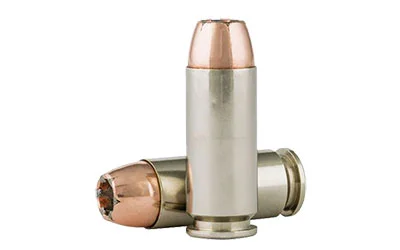
Winchester Ranger T Series is part of the Winchester Law Enforcement line, meaning it's supposed to only be sold to law enforcement. Since ammunition is sold to consumers (institutional or private) by a distributor rather than by the maker, that means some won't abide by that 100 percent and thus you can get it.
The T series, for those unaware, is basically the old Black Talon round sans black coating. While the Black Talon was certainly very good 9mm ammunition, it wasn't the manstopping ballistic wunderkind that people like to say it was on the internet. It was very good, but don't let anyone fool you.
Ranger T Series is known for good penetration and reliable expansion in testing, and a number of police departments nationwide have found it very suited to its task. It can work in shorter barrels but a compact or full-size will get a bit more out of it since it is a duty round. Some hunting will be involved (you have to find a willing distributor) but it isn't terribly difficult to source.
But What About RIP Rounds?
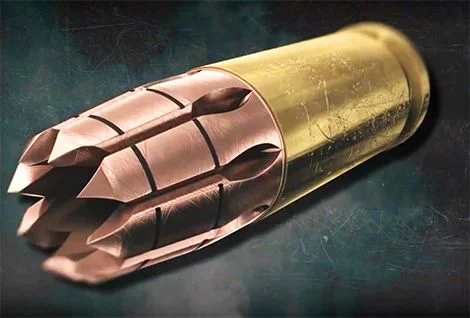
A brand and box that's been catching on lately is the RIP by G2 Research. The name is "Rapidly Invasive Projectile" not anything else, so let's not get into that. This ammunition has a unique design, which some people find attractive. However, others believe that the wheel is reinvented dramatically less often than various people (who are trying to sell you stuff) say.
RIP rounds are built like a hollow point, though they aren't. They're all copper, with a copper base kind of like a wadcutter with a jacket (of sorts) extending past the base. The jacket is cut, which leads to weak petals that peel off upon entering soft tissue. The jacket breaks off into trokars ostensibly piercing soft tissue targets (organs, veins, arteries) and the core continues deeper into the target - again - kind of like a wadcutter.
Does it work?
RIP hasn't published tests using the FBI protocol. Granted, the FBI ammunition tests aren't a perfect arbiter of ammunition performance; they merely simulate what's likely to happen in real-world conditions. Problem with real-world conditions of course is that they are unique to exactly where, when and how they happen and are therefore impossible to perfectly predict or to simulate. So you can't say it won't work just because it hasn't passed some test that the government cooked up 30 years ago.
The answer is mostly no. The trocars don't really do anything though the core of the bullet does penetrate deeper in gel tests. It's meme-tier, so the answer is just don't.
Speer Gold Dot 9mm Ammo

Speer Gold Dot is one of the stalwarts of 9mm ammo for defense, as it's carried nationwide by many police departments and LEO agencies (including the FBI) as well as civilians. It's renowned for being incredibly accurate with good penetration and reliable expansion in almost all popular calibers in standard and +P loadings.
Gold Dot was the first of the popular bonded hollow points, quickly gaining a reputation as an excellent duty round. Speer was also one of the first companies to formulate ammunition for short barreled pistols as the 124-grain .38 Special +P JHP round - aka the "New York load" - was devised by them at the behest of the NYPD.
Speer Gold Dot 124- and 147-grain loads (both standard pressure and +P) are - like HST - standard issue with police departments all over the country, with a track record confirming reliable performance. It's a no-brainer; if your gun cycles it and it shoots to the sights, stock up and feel confident that you've made a good choice.
Remington Golden Saber 9mm Ammunition

Everything that could be said about Winchester Ranger T Series can be said about Remington Golden Saber. It's a LEO round, but some distributors will sell to the public. It's known for good penetration and reliable expansion. If you carry a larger gun, you'll likely get a bit more out of it.
There are standard and bonded versions out there, should you decide to look into it. Just like with Ranger T Series, you're going to have to do some hunting to find it, but it is a very popular round with police departments and federal agencies, so it's a good choice for a carry round.
Winchester Defender 9mm Ammo
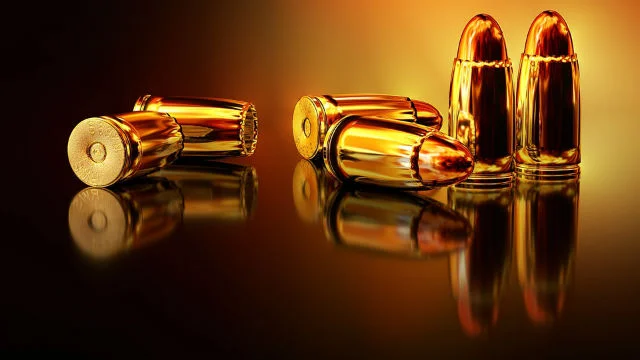
Winchester Defender, formerly Winchester PDX1 Defender, is the Ranger T series wearing civilian clothes. This way, you don't have to necessarily bother trying to find a distributor that will sell to you directly; a lot of gun stores have Defender 9mm ammunition on shelves.
Why bother trying to find T series and, for that matter, why even bring up the LEO ammo in the first place? Because a box of 50 T Series goes for only a few dollars more than a box of 20 Defenders through the retailers that will sell to you.
What About Liberty Civil Defense 9mm Ammo?
Another brand and box that gets people curious is Liberty Civil Defense 9mm ammo. Liberty takes a slightly different tack compared to traditional JHP.
Liberty Civil Defense goes the lighter/faster route, employing a 50-grain nickel-coated copper hollow point. It's propelled to +P velocities achieving 2000 fps, which independent reviewers have largely confirmed to be accurate.
The idea is to propel the bullet fast enough for ensure reliable expansion as well as to produce hydrostatic shock, a pressure wave that damages elastic tissue. While common with rifle cartridges, it's harder to do with standard handgun projectiles without pushing chamber pressures far beyond what's safe.
The reality is that no pistol bullet is propelled to sufficient velocity to achieve hydrostatic shock, and most light-for-caliber/high-velocity ammunition is known for underpenetration and has been for decades. Civil Defense is no exception.
Plenty Of Other 9mm Ammo Out There

This list wasn't (and certainly wasn't intended to be) fully comprehensive; just a decent list of the available 9mm CCW ammo for concealed carry and home defense that's on the market today.
All are known to be decent performers and at a variety of price points ranging from less than $20 for a box of 20 (Corbon) to more than $30 for the same amount (HST) and about $22 or so for a box of 50, such as Winchester white box. You get the general idea.
There are more out there, so do be sure to test a few out. You'll probably find a box or two that your gun happens to group very closely and feeds easily. That is the load to carry. If it's a reliable defense round, and you happen to shoot it well, then that's the load to get.




